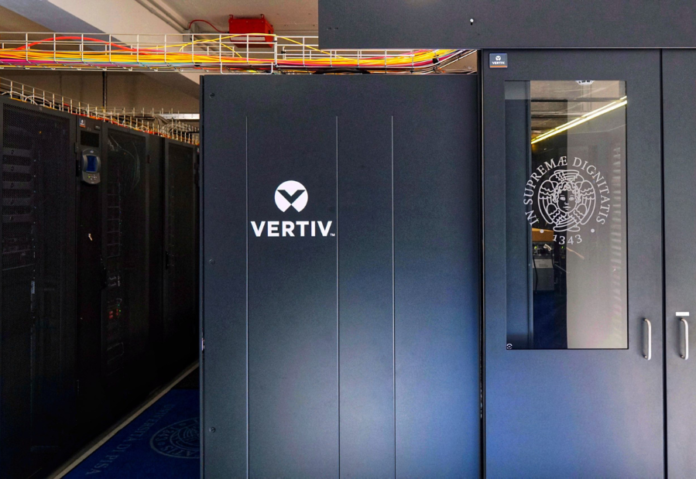
Deployed power and liquid cooling solutions respond to the challenges of ‘The Hybrid Green Data Centre Expansion’ project to improve energy efficiency, reduce operating costs and optimise available space
The University already had three data centres in the city to support teaching and research activities and needed to further enhance the infrastructure to provide greater efficiency and agility.
Mumbai, India [April 2024]: Vertiv, (NYSE: VRT), a global provider of critical digital infrastructure and continuity solutions, has been selected by the University of Pisa to extend its existing data centre infrastructure and provide the new power and liquid cooling equipment needed to meet the new demands of high-performance computing systems and maintain high operational flexibility.
The University of Pisa, founded in 1343, is one of the oldest and most prestigious universities in Italy and Europe. Its organisation is made up of 20 departments, which include humanities, sciences and computer sciences, with about 50,000 students enrolled in different degree courses. The University already had three data centres in the city to support teaching and research activities and needed to further enhance the infrastructure to provide greater efficiency and agility. In 2016, the University of Pisa embarked on a project for the development of a new data centre called “The Green Data Centre“. Vertiv was chosen to provide the critical power and cooling infrastructure, and the successful implementation of the project led to a strong technical and strategic relationship with the University. More recently, the University turned to Vertiv to expand this data centre and support the infrastructure demands of high-performance computing applications.
“The main objective of our project known as ‘The Hybrid Green Data Centre Expansion’ was to use the available wing of the building, while keeping the original design and user interface intact,” said Maurizio Davini, CTO at the University of Pisa. “We also needed to integrate new technology elements that help to meet the growing demands of high-performance computing, while providing excellent operational flexibility. The requirements have been fully met by Vertiv, which has allowed us to keep energy costs under control for efficient management of our new data centre.”
“The increasing adoption of high density and AI applications is demanding innovative infrastructure strategies,” said Giordano (Gio) Albertazzi, CEO at Vertiv. “Vertiv’s solutions, including liquid cooling for direct-to-chip applications and high density power systems, will provide the University of Pisa with the capacity they need to support a new generation of computing and future generations of student research.”
Vertiv provided a mix of power, cooling, rack, networking and service solutions, including four Vertiv™ DCC containment solutions for corridor closures. In terms of cooling, the hybrid solution includes twenty Vertiv™ Liebert® CRV row-based cooling units and two Vertiv™ Liebert® PDX-PI direct expansion floor-mount cooling systems with variable speed compressors, as well as three Vertiv™ Liebert® XDU liquid cooling units, which control the temperature and flow of the refrigerant to the servers in a direct-to-chip application.
Vertiv also supplied several power solutions, including two Vertiv™ Liebert® APM 500 kVA UPS (uninterruptible power supply) systems and VRLA batteries, eight Vertiv™ Liebert® RXA switchgear units, a 400kW Vertiv™ Power Module prefab solution, 76 Vertiv™ Geist™ Switched PDUs (power distribution unit) and 38 Vertiv™ VR racks. In particular, the external Vertiv Power Module enabled the expansion of the data centre despite space constraints within the building. Vertiv provided a turnkey solution, managing the suppliers and subcontractors to complete the interior space with fire detection and extinguishing systems while an external 630kW backup generator was integrated with the Vertiv Power Module.
Vertiv also provided consulting, design, installation and commissioning services, including the integration of the Vertiv™ Environet™ Alert monitoring software, which allows the customer to remotely monitor the entire infrastructure.
“Based on the needs highlighted, we suggested to the University of Pisa to adopt Liebert® XDU liquid cooling systems, and then created tailor-made hybrid corridors, which integrate both air cooled and new liquid cooled equipment,” said Andrea Faeti, sales director for enterprise accounts in Italy at Vertiv. “The hydraulic infrastructure has been expanded, allowing previously installed cooling units to supply chilled water to new data centre equipment. In addition, space constraints prompted us to design an external Vertiv Power Module customised to the site’s specific requirements. The solution was completed with our monitoring service that provides real-time visibility and control to the entire data centre infrastructure.”
Among the main benefits provided by the newly deployed Vertiv solutions is the implementation of liquid cooling in existing air-cooled data centres. Combining air and liquid cooling is one of the latest trends in thermal management, to enable reduced energy usage for higher capacities of cooling. Finally, the new infrastructure provides a series of benefits such as high resiliency, efficient cooling for high-density equipment, and enhanced monitoring and management to maintain system availability.
For more information about Vertiv’s work with the University of Pisa, read the case study at this link. To learn more about Vertiv solutions for AI and high-density applications, visit Vertiv.com.
Also read: Nurturing Responsible Online Behavior in Students by Building a Culture of Digital Citizenship
Do Follow: CIO News LinkedIn Account | CIO News Facebook | CIO News Youtube | CIO News Twitter
About us:
CIO News, a proprietary of Mercadeo, produces award-winning content and resources for IT leaders across any industry through print articles and recorded video interviews on topics in the technology sector such as Digital Transformation, Artificial Intelligence (AI), Machine Learning (ML), Cloud, Robotics, Cyber-security, Data, Analytics, SOC, SASE, among other technology topics.





